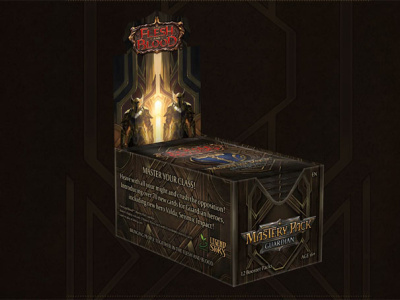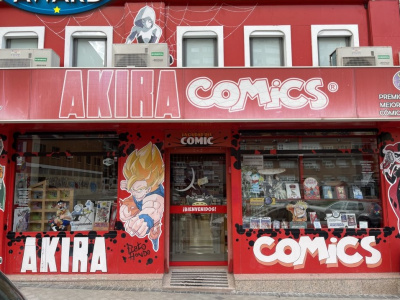
I Think I Can Manage is a weekly column by retailer Steven Bates, who runs Bookery Fantasy, a million dollar retail operation in Fairborn, Ohio. This week, Bates talks about battling the comic/game store stereotype:
Last week I was honored by a visit from Diamond Comics Field Sales Representative Dave Hawksworth. Though his territory is officially the western United States (California, Utah, Nevada, and Colorado), Dave's family resides in central Ohio, so I see him occasionally when he's 'in town,' usually around Mid-Ohio Con time Thanksgiving weekend. This 'surprise visit' was part of Diamond's on-going 'From the Road' feature seen in Dialogue and elsewhere, showcasing the various comics and games retailers across America.
Dave was also taking pictures for a future project Diamond will unveil at the Retailer Summits this fall, a slideshow/scrapbook/handout dealio on successful specialty store retailing. Photographing displays, signage, and pseudo-boutiques throughout the shop, Dave was very complimentary about the Bookery and the staff. Loving to hear praise, of course I pressed him for details. The ensuing conversation left me feeling both proud and wistful; while I really dug the props Dave gave us for our numerous good points, his comparisons to other shops made me ponder the state of our industry. Being ever the diplomat, Dave was reticent to identify any particular retailers, but I've been in enough different stores to know the kinds of places he described, and I had hoped that the stereotypical comics and games retailer had gone the way of pogs, beanie babies, and foil-enhanced die-cut covers. Alas.
I call it the '3-D Model:' Dark, Dirty, and Disorganized. We've all seen at least one shop like this, and probably dozens. They're owned and operated by fanboys and gamers, guys stuck in perpetual adolescence and interested only in sustaining the hobby that's gotten them through dateless decades of high school, college, rehab, and, possibly, prison (though that last option might invalidate the whole 'dateless' thing). Sure, they know their stuff; they can quote 'hit points' and 'resurrection spells' and actually know the difference between an orc and a lich. Engage them in conversation (if you can pull them away from the tattoo artist touching up their Metallica tatt) and they'll rattle off the intricate details of Batman's pre-Crisis, post-Denny O'Neil/Neal Adams origins, or correct you on the nature of Thor's powers, which always leads to the argument of who would win in a battle, Odin-son or Superman. These people are not stupid.
So why can't they operate a vacuum cleaner?
Our industry grew out of the habits of our youth. Comic books, toys, games, trading cards, even animated movies (Japanese or domestic) have largely been the entertainment of choice by kids for decades. Even with competition from videogames, the Internet, and nightly soccer matches, kids still discover the stuff we found so magical all those years ago. Maybe it's through Cartoon Network, or the public library, 7-Eleven, a movie theater promotion, or even Free Comic Book Day, but kids are still drawn like moths to the flame by these youth entertainment staples. And, as any parent reading this can attest, young people are not really bothered by dark, dirty, and disorganized spaces. Just look at their rooms.
The problem is, kids don't have that much money. And if they do, it's probably regulated by Mom & Dad. What happens when Mom walks in with Janie and Junior and catches a whiff of Jocko behind the counter, who gave up bathing to protest the heinous treatment of Hydro-Man? What will Dad do when he and Little Timmy trip across Heavy Metal mixed with Batman Strikes? Assuming, of course, they even set foot in a shop barely lit by one flickering-humming fluorescent bulb, carpeted with Yu-Gi-Oh! wrappers and HeroClix boxes, which looks like it was organized and decorated by Hurricane Andrew. Up until a certain age, parents mostly control where their children go, how they spend their money, and what kind of people they associate with. This leads me to ask, is your shop on Mom & Dad's A-list?
Obviously, it takes all kinds of specialty shops to appeal to the diverse mix of readers, gamers, and collectors out there. Quite possibly you've carved out a pretty unique niche in your local market, servicing a segment of the population largely ignored (or worse) by middle class America. Good for you. But I challenge you to consider an alternative vision of your business, one where your present regulars intermingle with average Joes, professional women, suburban Moms and Dads, and those most elusive of all beasts, the kids.
It starts with your attitude. The beauty of operating a business in America is that no one has the right to tell you how to run it, as long as you're within the law (and those nebulous community standards). You want your comic or gaming store to look like a biker bar, a barn, or the Batcave, that's your business. But put yourself in the shoes of the more conservative customer, the Mom and Dad from the suburbs. If they don't want to patronize your shop, neither will Junior or Janie. And there goes the next generation of fans.
With their allowance.







